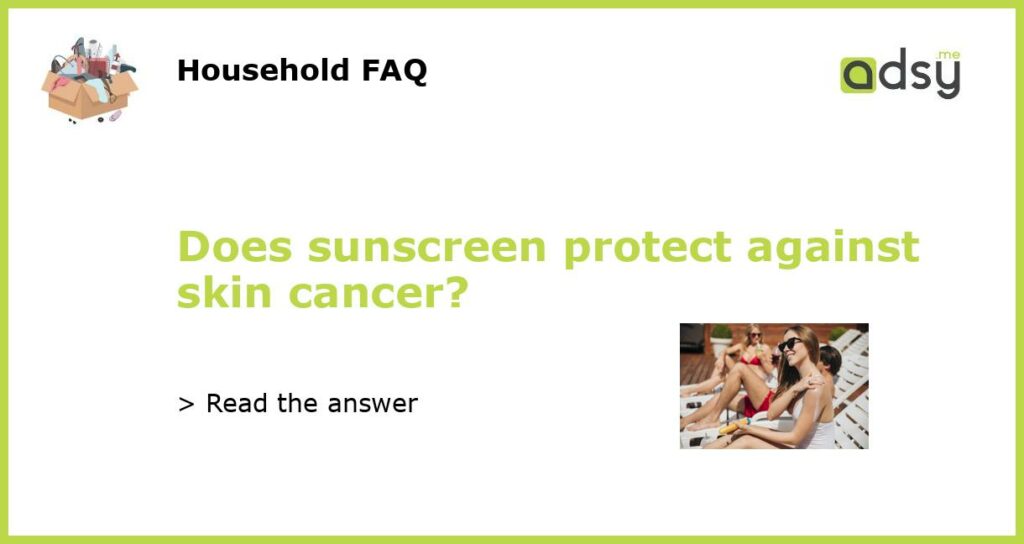Does Sunscreen Protect Against Skin Cancer?
The Importance of Sunscreen
Sunscreen is a widely used product that is essential in protecting our skin from the harmful effects of the sun. It is often seen as a barrier against the sun’s ultraviolet (UV) rays, which are known to contribute to skin damage and increase the risk of developing skin cancer. But how effective is sunscreen in actually preventing skin cancer?
Understanding Skin Cancer
Skin cancer is a serious condition that occurs when abnormal cells in the skin start growing out of control. This can lead to the formation of tumors and, if left untreated, it can spread to other parts of the body. There are three main types of skin cancer: basal cell carcinoma, squamous cell carcinoma, and melanoma. Melanoma is the most dangerous type, as it has the potential to spread rapidly.
The Role of Sunscreen in Skin Cancer Prevention
Sunscreen, when used correctly, can help protect against skin cancer by blocking or absorbing UV radiation. It works by either absorbing the UV rays or reflecting them away from the skin. Sunscreen contains active ingredients, such as zinc oxide or titanium dioxide, which act as a physical barrier against the sun’s rays.
According to the Skin Cancer Foundation, regular use of sunscreen with an SPF (sun protection factor) of 15 or higher can reduce the risk of developing squamous cell carcinoma and melanoma by about 40%. Sunscreen should be applied liberally and reapplied every two hours, especially after swimming or sweating. It is also recommended to avoid direct sun exposure during peak hours.
Limitations of Sunscreen
While sunscreen is an important tool in protecting against skin cancer, it is not a foolproof method. There are a few limitations to consider:
- Inadequate Application: Many people do not apply enough sunscreen or do not reapply it often enough for it to be effective. It is important to apply sunscreen generously and evenly to all exposed skin, including the face, neck, arms, and legs. It should be applied at least 15 minutes before going outside and reapplied every two hours or immediately after swimming or sweating.
- Incomplete Protection: Sunscreen does not provide complete protection against all types of UV radiation. It primarily protects against UVB rays, which are responsible for sunburns and contribute to the development of skin cancer. However, UVA rays can also cause skin damage and increase the risk of skin cancer. Look for broad-spectrum sunscreen that provides protection against both UVA and UVB rays.
- False Sense of Security: Relying solely on sunscreen may lead to a false sense of security and encourage excessive sun exposure. It is important to practice other sun-safe behaviors, such as seeking shade, wearing protective clothing, and using sunglasses and a wide-brimmed hat.
Additional Forms of Protection
In addition to using sunscreen, there are several other measures you can take to protect your skin from the sun’s harmful rays:
- Seek shade: Avoid direct sun exposure during peak hours, typically between 10 am and 4 pm when the sun’s rays are the strongest.
- Wear protective clothing: Cover your skin with long-sleeved shirts, pants, and wide-brimmed hats to minimize exposure to UV radiation.
- Use sunglasses: Wear sunglasses that provide 100% UV protection to shield your eyes from the sun’s rays.
- Avoid tanning beds: Tanning beds emit UV radiation, which can increase the risk of skin cancer.
- Regular skin exams: Perform regular self-exams to check for any changes in your skin and consult a dermatologist if you notice any suspicious moles or growths.
In conclusion, while sunscreen is an important tool in protecting against skin cancer, it is not a standalone solution. It should be used in conjunction with other sun-safe practices, such as seeking shade, wearing protective clothing, and avoiding tanning beds. By combining these measures, you can help reduce your risk of developing skin cancer and maintain healthy skin.






